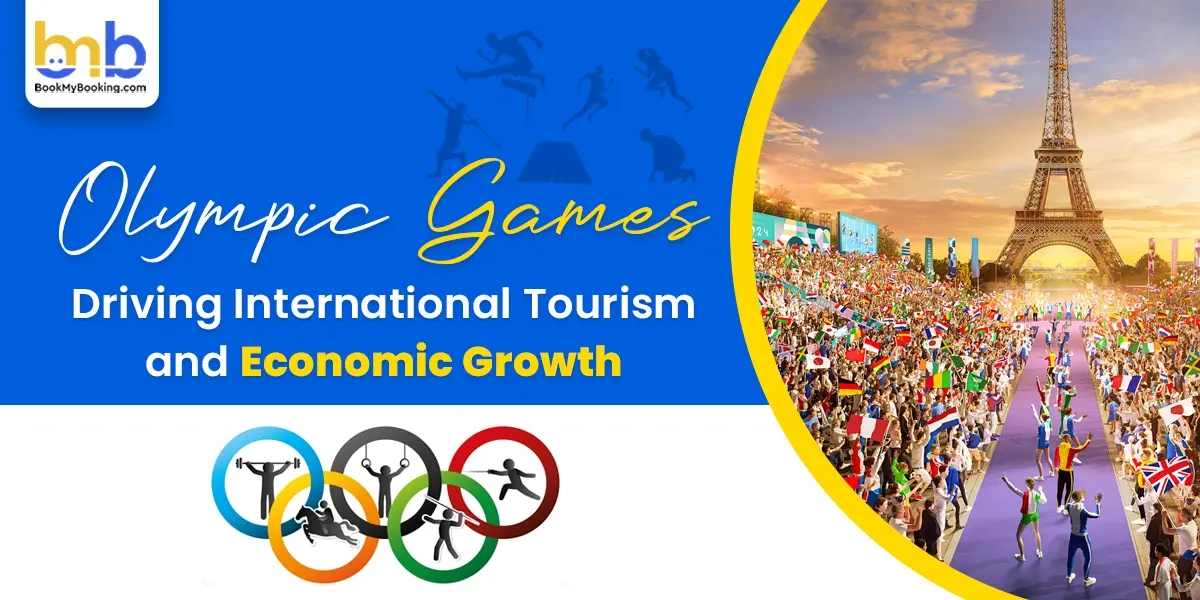The Olympics have long been a symbol of athletic excellence and international unity. Celebrating International Olympic Day on "June 23" allows us to reflect on the Games' rich history and evolution. From their origins in ancient Greece to their modern and contemporary global spectacle, the Olympics hold a distinctive place in the hearts of people around the globe. The Paris Olympics 2024, officially the Games of the XXXIII Olympiad and officially named Paris 2024, is an international multi-sport event in France from July 24 2024, to August 11 2024, with the opening ceremony on July 26. The host city is Paris, where events are held in 16 additional towns spread across Metropolitan France. The event stretches its wings further in Tahiti, French Polynesia.
Originated in Ancient Games
The Olympic Games started in Olympia, Greece, around 776 BC. These ancient games were deeply infused with Greek culture and religion, honouring their god Zeus. Some early events included running, wrestling, and chariot racing, with athletes competing for glory and a simple olive wreath. Participation at that time and even today in the Paris Olympic Games 2024 is a matter of great honour, with athletes representing many city-states.
The Ancient Olympics Games: Traditions and Highlights
The original Games followed a structured format that occurred every four years and lasted five days. Events ranged from foot races to pankration, a deadly combination of boxing and wrestling. Notably, athletes like Milo of Croton became a legendary figure. The Games united Greek society, fostering political and cultural ties in the often warring city-states.
The Decline and Revival of the Olympics
The ancient Olympics and medal table decreased due to political changes, and the rise of Christianity viewed the pagan festivals unfavourably. Emperor Theodosius I officially abolished the Games in 393 AD. After many centuries, Pierre de Coubertin revived the Olympic spirit in the late 19th century, which aimed to promote peace and understanding through sports.
The Modern Olympic Movement
The first modern Olympic Games were held in 1896, marking a new era for international sports competitions. The International Olympic Committee was established to oversee the Games organization and growth. Since then, the Olympics have expanded significantly, embracing more sports, countries, and athletes in every iteration. The Paris 2024 Olympics would mark the third time hosting the Summer Games scheduled from July 26 to August 11. The name of the Paris Olympic mascot is Phryge, which is based on the traditional tiny Phrygian hats that the mascots are shaped after. The name and design were chosen as symbols of freedom and representing allegorical figures of the French Republic. The event would feature new sports, with venues consisting of iconic sites like the Eiffel Tower and the Seine River.
Olympic Logo and Changes of Motto
- The Olympic logo, known as the Olympic Rings, is a symbol recognized worldwide. It was created by Pierre de Coubertin in 1913 and comprises five interlocking rings in blue, yellow, black, green, and red on a white background. Per the Paris Olympics 2024 highlights, each ring represents one of the five inhabited continents of the world: Africa, America, Oceania, Europe, and Asia. Thus, the logo symbolizes the universality of the Olympic Movement and the meaning of athletes worldwide at the Olympic Games.
- The motto of the Olympics was originally Citurs, Altius, Fortius, which translates from Latin to Faster Higher and Stronger. Pierre de Coubertin proposed this motto upon the founding of the International Olympic Committee in 1984; in the year 2021, the motto was updated to Citrus Altruis Fortius Community, adding the Latin word for Together to emphasize solidarity and unity, especially in the light of the global challenges faced in the COVID 19 pandemic essential to acknowledge on the event of France Olympics.
What are some of the Significant Benefits of hosting an Olympic Games?
Did you know that the Olympic Games are a premier international occasion held every four years, with the Summer/Winter Games alternating every two years? There is more than just a showcase of athletic prowess. They embody a complex mixture of historical significance, cultural exchange, economic impact, and global unity.
The Olympics help promote Peace and Unity.
One main aim of the Olympic Games is to bring international peace and understanding among nations. In a world often divided by political, social, and economic differences, the Olympics provide a platform for countries to unite in the spirit of friendly and healthy competition. Covering the Paris Olympics Latest News, the Olympic Charter emphasizes the role of the games in promoting and fostering a peaceful society concerned with preserving human dignity. The participation of athletes from almost every country depicts a commitment to these ideals.
Celebration of Athletic Excellence
The Olympics serves as a great opportunity in ultimately staging for athletes to showcase their skills. Competing at the Olympics is a dream for many athletes as it represents the height of sporting accomplishments. The rigorous training and dedication required to qualify for the Olympics highlight the human capacity for hard work, perseverance, and resilience. Olympics in Paris, where the games feature many sports, from traditional track and field events to contemporary additions like skateboarding and surfing, as well as persistence and resilience. The game features various sports, from conventional track and field events to modern additions like skateboarding and surfing, celebrating the diversity of athletic talent worldwide. The Paris Olympic Stadium for the 2024 Games is Strade de France, situated in Saint-Denis. This iconic venue would host the opening and closing ceremonies and track and field events. The Paris Olympics Stadium is renowned for its history and capacity as it embodies the spirit of the Games and French culture.
Exchange of Culture and History
The Olympic Games are a centre of cultures; athletes and people from varied backgrounds celebrate this event under one roof, bringing their distinctive customs and traditions. The cultural exchange fosters mutual understanding and respect among the nations. The opening and closing ceremonies of the Olympics in Paris are particularly prominent as they usually include performances that showcase the host nation's cultural heritage while celebrating global diversity.
Economic and Social Impact
Hosting the Olympic Games can have prominent economic benefits for the host city and country. The influx of tourists stimulates local businesses and creates jobs. Building new sports facilities and infrastructure, such as transportation networks and hotels, can create lasting benefits. However, the economic knock can be a double-edged sword. The housing cost of the games is substantial, and there is always a risk of facilities becoming underused post-games.
Inspirational and Legacy Driven
Paris Olympics medal winners would inspire millions of people worldwide. The stories of athletes overcoming adversity, breaking records, and achieving their dreams motivate individuals of all ages to engage in sports and adapt to healthier lifestyles. The legacy of the games extends beyond the two-week event; host cities often benefit from improved infrastructure, and the sports facilities built for the Olympics can serve local communities for years to come.
Promoting Sustainability and Innovation
The International Olympic Committee has recently strongly emphasised sustainability and scheduled the Paris Olympics likewise. Initiatives such as using existing venues, implementing eco-friendly practices, and ensuring a positive legacy for host cities are now crucial to the games' planning and execution. This shift reflects a broader commitment to addressing global environmental challenges and promoting sustainable development.
Images Source is Canva: This is created by the author
Information Source: The Economics of Hosting the Olympic Games
What are the expected costs of the 2024 Paris Olympics?
When it won its bid in 2017, Paris budgeted about $8 billion for the 2024 Olympics. The city has since upped its budget by many billion dollars. Costs are split evenly between operating expenses and new infrastructure, as per S&P Global ratings analysis. Paris Olympics 2024 will host the cheapest Summer Games in decades if the final cost stays in that ballpark. Organizers say the decision to depend almost entirely on existing venues, such as those built for the annual French Open and the 2016 European Football Championship, has held down costs. The games will also be spread to stadiums in other French cities, including Lyon, Marseille and Nice. But Paris has still spent $4.5 billion in infrastructure, including $1.6 billion for its Olympic Village, the price of which is at least one-third more than it originally budgeted.
Does the Olympics have a productive impact on tourism in host cities?
Of course, the Paris Summer Olympics directly promote the local tourism industries, increasing business for hotels, restaurants, and local attractions. In addition, the Olympics also improve the infrastructure, like transportation and public facilities, that enhance the quality of life in the community and promote the city's image as a tourist destination. The Olympics also benefit tourism for the host country by increasing global visibility and stimulating tourism-related businesses, thus creating opportunities to promote the area's heritage, natural sites, culture, and reputation.
How does the Olympics impact the hospitality industry of a host city?
The Olympics in Paris increases the demand for services in hotels, restaurants, and other hospitality sectors. This creates more employment opportunities to accommodate the tourist surge, leading to upgrades and investments in lodging, dining, entertainment, and service industries. However, the hospitality industry needs to prepare for the post-Olympic period to address potential overcapacity issues after the visitor spike in the subsidies.
How do the Olympics affect the lives of residents in host countries?
Hosting the Olympics is a complicated endeavour that involves various sports stakeholders, educational programs, residents, businesses, and government organizations throughout the country. France's Olympics creates an ever-changing exchange among the participating local parties. However, residents in the host countries can benefit from the opportunities that arise due to the Olympics, such as Olympic education programs in local schools and housing options after the Olympics are over. Infrastructure developments and cultural interactions with visitors from other countries can also enhance the quality of life for locals.
The youth in the host country benefit from having the opportunity to compete on such a large stage on their home soil. As per the Paris Olympics 2024 highlights, the host country benefits from promoting the location's image through free media coverage. This ultimately helps local people feel proud of their country, contributing to a higher quality of life.
What are the benefits of hosting the Olympics?
One of the most enormously neglected benefits is human capital development for those working for the Olympics. There is a networking establishment among the businesses that have to deliver on various goals related to the Olympics, such as marketing, security, transportation, urban planning, and sports development, known as the business legacy from hosting the Olympics.
Paris Olympics Dates are scheduled from July 26th to August 11 2024, which includes funds to enhance local sports ahead of the Olympics. The event's catalytic nature creates positive results for the host community. These results include better prominent tourism infusion, improved or new sports facilities, better transportation, and more cultural experiences that might have taken much longer to materialize had it not been for the hosting of the Olympics. The social impacts related to increased volunteering chances and enhanced sports programs for the residents are added benefits.
A Positive Impact on the Tourism Industry
As part of France's original bid to reshape the Olympics, the French Center for Sports Law and Economics conducted an economic impact study in 2016. At the time, the study said that, per the Paris Olympics news, it would generate up to 10.7 billion positive impacts and 247,000 jobs. Of the 10.7 billion, between 1.4 and 3.5 billion would be derived directly from tourism. Much has changed since this study was undertaken, not least a four-year pandemic and a cost of living crisis with high inflation levels and elevated interest rates.
France will see a better spending boost than Paris
Oxford Economics said the original pre-bid analysis incorporated more recent economic variables. Compared to 2019, overall inbound travel to France and Paris could increase by 5-10%, as per the Olympics live update. Surprisingly, overall inbound spending would grow more quickly for France, by 24%, than is expected for the host city, Paris, which is 13%. Although the average spending amongst all tourists would hold steady, with a rise of just 3% expected nationally, it should increase by almost one-fifth. Inflationary pressures and financial caution among travellers can explain the more significant impact of the Olympics outside the host city.
According to the latest updates on the Paris Olympic Games 2024, expectations of higher pricing in Paris and reduced accommodation availability may have persuaded travellers to look further afield for accommodation. Many are likely to book stays in towns and cities with good transport links to the capital; locations from Paris may be reached by rail within 90 minutes.
The unusual demand levels this would create in destinations outside Paris would feed through to more robust spending increases in these secondary locations. The boost from an influx of Olympic tourists may be expected to be partially offset by the costs of disruption to regular activity in Paris as per the Paris Olympics 2024. Businesses risk seeing their average customer footfall disrupted by road closures and other adjustments to make the city more accommodating for visitors to the Olympics.
The Hoteliers would not necessarily see the full benefit of the higher price paid by the tourists. With the tourist tax rising by nearly 30% to between € 2.60 and € 14.95 per night, depending on accommodation type, hoteliers may be reluctant to increase the actual room rate as much as they would like. The Paris Olympics' sustainability credentials and legacy promise sufficient improvement in the image of the events to attract even more visitors. The extra domestic and international tourists that could be attracted would see the spending benefits exceed what Oxford Economics currently says.
Image source: The image is made in Canva
Note- Visitors and Inbound Spend Average Spend are in Millions
Economic Boost from the Olympics
The Olympic Games represent the most significant global sporting events, thus providing robust economic benefits for host cities and nations. A vital aspect of the financial boost is the revenue generated from various sources like ticket sales, tourism, broadcasting rights, sponsorships, etc. This revenue's primary purpose and benefit is to fund games, support the host city financially, and promote sports development worldwide.
Sale of Tickets
Ticket sales are said to be the primary source of revenue for the Olympic games; the scale of the event spans multiple sports and venues that attract millions of people from around the world. For example, the London Olympics 2012 sold approximately 8.2 million tickets, generating around $1.2 billion. (Source:https://stillmed.olympic.org/Documents/IOC_Marketing/London_2012/LR_IOC_MarketingReport_medium_res1.pdf.) These funds then helped cover the operational costs of the games, like security, logistics, and event management. Paris Olympic Ticket sales support the local economy by driving demand for accommodation, transportation, and many other services, thus creating more employment and stimulating business activity.
Allocating Revenues
The Olympic revenue is a carefully managed process; a prominent portion of the funds is used to cover the operational costs of hosting the games, venue construction, infrastructure development, and event management. The remaining funds are distributed to stakeholders, including the IOC, International Sports Federations and National Olympic Committees. These activities support sports development globally, funding training programs, competitions and other initiatives promoting physical activity and healthy lifestyles.
Paris Olympics Live Updates
The programme of the 2024 Summer Olympics features 329 events in 32 sports, including the 28 main Olympic sports contested in 2016 and 2020 and four optional sports that were proposed by the Paris Organising Committee breaking would make its Olympic debut as an optional sport like skateboarding, sport climbing and surfing that would return from 2020. Per the Paris Olympics Live Updates, four events have been dropped from weightlifting. Also, two sprint events have been replaced with two slalom events, keeping the overall total at 16. In sport climbing, the previous combined event has been divided into separate speed climbing and boulder and lead disciplines for each gender.
List of Sports in the Paris Olympics 2024
- Archery
- Artistic Gymnastics
- Athletics
- Badminton
- Basketball
- Artistic Swimming
- Boxing
- Beach Volleyball
- Breaking
- Basketball 3x3
- Canoe Slalom
- Canoe Sprint
- Cycling BMX Freestyle
- Cycling BMX Racing
- Cycling Mountain Bike
- Cycling Road
- Cycling Track
- Diving
- Equestrian
- Fencing
- Football
- Golf
- Handball
- Hockey
- Judo
- Marathon Swimming
- Modern Panthalon
- Rhythmic Gymnastics
- Rugby Sevens
- Rowing
- Sailing
- Shooting
- Sport Climbing
- Skateboarding
- Surfing
- Swimming
- Table Tennis
- Taekwondo
- Tennis
- Trampoline
- Triathlon
- Volleyball
- Water Polo
- Weightlifting
- Wrestling
Image Source is https://olympics.com/en/paris-2024/sports
Everything Considered
The Paris Summer Olympics are a multifaceted game with a rich history and a profound impact worldwide. They promote peace and unity, celebrate worldwide with athletic excellence and cultural exchange, stimulate economic growth, and inspire millions worldwide. While the games occur every four years, their influence resonates long after the closing ceremony, leaving a legacy beyond borders and generations.



